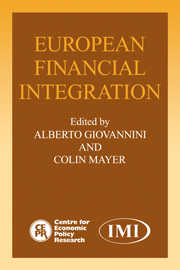Book contents
- Frontmatter
- Contents
- List of figures
- List of tables
- Preface
- List of conference participants
- Foreword
- 1 Introduction
- 2 Banking competition and European integration
- Discussion
- 3 Banking, financial intermediation and corporate finance
- Discussion
- 4 How (not) to integrate the European capital markets
- Discussion
- 5 European financial regulation: a framework for policy analysis
- Discussion
- 6 Corporate mergers in international economic integration
- Discussion
- 7 Capital flight and tax competition: are there viable solutions to both problems?
- Discussion
- 8 Reflections on the fiscal implications of a common currency
- Discussion
- 9 Currency competition and the transition to monetary union: does competition between currencies lead to price level and exchange-rate stability?
- 10 Currency competition and the transition to monetary union: currency competition and the evolution of multi-currency regions
- Discussion of chapters 9 and 10
- 11 Problems of European monetary integration
- Discussion
- Index
Discussion of chapters 9 and 10
Published online by Cambridge University Press: 04 August 2010
- Frontmatter
- Contents
- List of figures
- List of tables
- Preface
- List of conference participants
- Foreword
- 1 Introduction
- 2 Banking competition and European integration
- Discussion
- 3 Banking, financial intermediation and corporate finance
- Discussion
- 4 How (not) to integrate the European capital markets
- Discussion
- 5 European financial regulation: a framework for policy analysis
- Discussion
- 6 Corporate mergers in international economic integration
- Discussion
- 7 Capital flight and tax competition: are there viable solutions to both problems?
- Discussion
- 8 Reflections on the fiscal implications of a common currency
- Discussion
- 9 Currency competition and the transition to monetary union: does competition between currencies lead to price level and exchange-rate stability?
- 10 Currency competition and the transition to monetary union: currency competition and the evolution of multi-currency regions
- Discussion of chapters 9 and 10
- 11 Problems of European monetary integration
- Discussion
- Index
Summary
The origin of Philippe Weil's paper in his discussion of Michael Woodford's ensures a high degree of consistency between them. Weil building, as he says, on Woodford's insights, spends less time on the foundations and offers the more intuitively accessible account. From this common story several points emerge both as conclusions and as limitations of the analysis.
The first point is that, since it is not disputed that in these models the utility function that includes money(s) is an indirect utility function, it is relatively difficult – and no attempt is made – to obtain welfare conclusions.
The second point is that under perfect substitutability (and zero real growth) the ‘virtuous’, more slowly growing, currency asymptotically accounts for a negligible proportion of the whole and aproaches (in the aggregate) zero purchasing power. Although Weil suggests that this is an example of Gresham's law, I do not see it as such. What we have here is two printing presses generating virtually identical notes at different rates. As a user, I have no interest in hoarding those from one press while passing-on the others – they have a single relative value of unity to all holders. The proposition in fact has no behavioural content beyond what is implied by the assumption of perfect substitutability and indefinite compounding.
Woodford's foundation for the analysis are ingenious and powerful but the assumption required for his aggregation to a representative global individual are very similar to those which have been shown to imply that ‘everything is neutral’ (Bernheim and Bagwell, 1988) – which does not give one confidence that essential features of reality have not got lost in the process.
- Type
- Chapter
- Information
- European Financial Integration , pp. 302 - 304Publisher: Cambridge University PressPrint publication year: 1991



